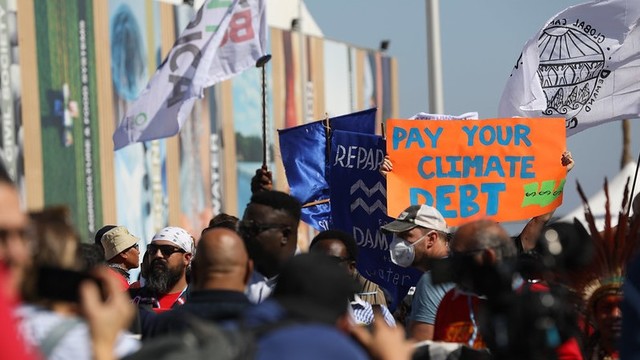
Carrying wood in Yangambi, Democratic Republic of Congo. IIED has completed a comprehensive assessment of its carbon emission and committed to becoming a net zero organisation (Photo: Axel Fassio/CIFOR, via Flickr, CC BY-NC-ND 2.0 DEED)
IIED made some significant progress towards its environmental sustainability goals in 2022/23. These included:
- Producing a first comprehensive environmental sustainability report
- Undertaking a thorough assessment of carbon emissions
- Committing to becoming a net zero organisation in line with science based-targets, and
- Developing a sustainable operations strategy.
The environmental sustainability report (also below) outlines IIED’s progress on assessing its environmental impact through travel, events, office premises and financial services suppliers. Below are some highlights of the report.
Financial services
During the year we reviewed the environmental implications of our banking services following an assessment of pension providers and decision to move our company pension scheme to Aviva.
We were pleased to see Aviva’s climate credentials confirmed in Make My Money’s matters assessment of the climate action plans of leading pension providers in February 2024, with the company coming top of the ranking.
Seeking similar improvements in our banking services, we have produced criteria and will run a tender process in early 2024 to find a provider committed to net zero and divested from fossil fuels.
Assessing carbon emissions
We worked with the carbon accounting platform Greenly to comprehensively assess our carbon emissions and understand ways we can reduce them, particularly given the global nature of our work and extensive travel.
This summary outlines our scope 1-3 emissions, encompassing direct and indirect greenhouse gas emissions associated with our operations and value chain.
Scope 1 emissions represent direct emissions from our controlled sources, which includes emissions from the generation of heating and cooling our offices.
Scope 2 emissions cover our indirect emissions resulting from the generation of purchased electricity accounting for under 1% of our total emissions.
Scope 3 emissions include indirect emissions from our entire value chain, accounting for 99% of our total emissions. The majority of these emission are attributed to our business travel with the remainder as a result of events staff attend and the purchasing of services.
Unsurprisingly our major source of carbon emissions is from business travel but the assessment highlighted the events we organise also account for nearly a quarter of our emissions.
We have been working with Greenly to understand how we can reduce these, not just through reducing flying but through more online events and increasing direct flights given the significant proportion of emissions that come from take-off and landing.
We have also started to talk to our suppliers of services such as information technology and human resourcesabouttheir carbon footprint and ethical practices.
Net zero target
The work to accurately assess our carbon emissions has given us a good basis to develop a net zero goal.
We have already committed to reduce our greenhouse gas emissions to as close to zero as possible and use reliable robust offsetting schemes for those we cannot cut. IIED’s role in hosting the chair of the Intergovernmental Panel on Climate Change, professor Jim Skea, has given added impetus to this work and we will progress this in early 2024.
Sustainability strategy
We are pleased to have made progress on these issues over the past 10 years and delivered on the commitments in our last responsible operations and environmental sustainability update.
Timeline: a decade of sustainable action
2013
Baseline reporting year
2014
Reduction in emissions by 16%
2015
New travel policy implemented
2016
Anti-fraud and bribery policy implemented
2017
2% increase in carbon footprint
2018
Vegetarian food policy for IIED-led events in Northern countries
2019
2% increase in emissions
2020
Zero air travel emissions due to COVID-19 pandemic
2021
London office move
2022
Environmental review completed
However, we recognise that sustainability needs to go beyond the environment and climate to encompass social and governance issues, and how our operations as well as our policy and research work is supporting achievement of the Sustainable Development Goals (SDGs).
Our new sustainability strategy, aligned with the SDGs, will be released alongside our new organisational strategy in spring 2024. 
This will include a series of commitments plus a benchmarking and reporting framework to ensure we make progress on our commitments and can be held publicly accountable for our progress.
This is something we need to see more public and private organisations commit to if we are to combat the climate nature and inequality crises facing the world.



